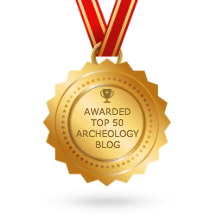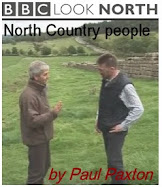I would like to take the opportunity to promote my region as a place to study archaeology, and in particular draw the reader's attention to a new MA in Heritage Management at Durham University.
"We have designed this degree to build upon our unique situation, living and working within a World Heritage Site - you will explore the concepts underlying the idea of cultural heritage and investigate the social, political, and economic impact of a variety of local, national, and international heritage organisations."
The Norman complex at the heart of city, was built for the Durham's Prince-Bishops, powerful and important figures who in some respects were in the
tradition of protecting the northern frontier represented by another nearby World
Heritage Site, the Roman Wall.
The Cathedral, [below] built between 1093–1133, is the finest
building that survives more or less intact from the Norman period. It houses relics of St Cuthbert, as well as St
Oswald and the Venerable Bede. The Cathedral’s
Dean and Chapter Library is home to a historically important collection of the early
books, documents, and monastic accounts.
Why Study Archaeology Heritage Management
As an archaeologist, I would be keen to point importance of
understanding our past of as part of a broader appreciation of ourselves, but
equally, archaeology in its many forms is part of something we might call ‘Heritage’,
a significant contributor to making Britain one of the world’s top tourist
destinations.
Tourism is a growing industry, worth £101 billion in 2011,
or 6.7% of total GDP, nearly five times the size of automotive manufacturing, and
providing 2.3 million jobs - almost as many as the financial sector. [1]
If you start to the surface of an idea like heritage and you
see a complex fabric; there are many competing interests, and the archaeologist
is both advocate, protector, recorder, and executioner for those unique fragments
of the past that remain. It is not a really
job for the faint hearted; it is a serious and complex responsibility.
Why study at Durham
To feel competent as a professional archaeologist in any
role, to function in the wild, you require a unique blend of practical and intellectual
skills, above all you have to learn to think
like an archaeologist; you get this from being around real archaeology.
 This is the great advantage of a University like Durham, is that it has a strong department with the resources and facilities to allow students to interact and
study all aspects of subject.
This is the great advantage of a University like Durham, is that it has a strong department with the resources and facilities to allow students to interact and
study all aspects of subject.
Some of the most innovative archaeology comes from working with
other disciplines and their technologies, and while libraries are important,
real archaeology happens in labs, drawings offices, commuter rooms, and, above
all, in the field.
Managing our heritage, the past above and below ground, is about both contemporary issues and the future, and we owe it posterity that we
do it well. Studying for an MA in Heritage at Durham, a World Heritage Site, offers
the opportunity acquire the knowledge, specialist skill set, and practical
experience that many large organisations require.
. . . and it is some of the better paid work in archaeology.
Sources
[1] This is according to new research from the World Travel & Tourism Council (WTTC) by Oxford Economics; [sponsored by American Express] Travel & Tourism’s total contribution to GDP in the UK was £101 billion in 2011, or 6.7% of total GDP. This compares 2.3% for automotive manufacturing, 1.9% for mining and 4.1% for chemicals.http://www.wttc.org/news-media/news-archive/2012/tourism-uk-contributes-more-gdp-automotive-manufacturing/
According to a recent Deloitte study 'The Economic Contribution of the Visitor Economy – UK and the nations' tourism was worth £115.4bn to the UK economy in 2009. http://www.visitbritain.org/insightsandstatistics/visitoreconomyfacts/
Original image sources;
http://en.wikipedia.org/wiki/File:Durham_Castle_Eingang.jpg
http://en.wikipedia.org/wiki/File:Durham_Millburngate_Bridge.jpg
http://upload.wikimedia.org/wikipedia/commons/4/47/Durham_Cathedral._Interior.jpg



















0 comments:
Post a Comment